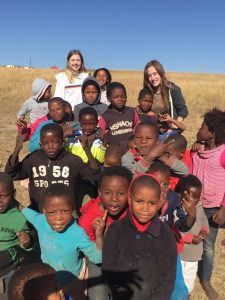This July the Center for HIV Identification, Prevention, and Treatment Services (CHIPTS) at UCLA) hosted a conference on Alcohol and the Elimination of HIV in Durban, South Africa. While attending the conference with my mother, I was also able to visit several research projects in both rural and urban sites in South Africa at which studies were being conducted to improve outcomes for people living with HIV. I was able to learn about this HIV and substance use issue and how these problems are being addressed locally and worldwide.
Our first destination was Mthatha, a rural town in the country’s Eastern Cape. We met with representatives from the Philani Maternal, Child Health and Nutrition Project based in Mthatha. Philani strives to improve community and family health, especially in poor, rural areas. The organization’s Mentor Mother Program focus is guiding local mothers through healthy pregnancies, HIV prevention, and rehabilitation of underweight babies by designating South African female volunteers to help these women. 
We toured Zithulele Hospital, a 147-bed district hospital located in the Eastern Cape. I met with the Medical Director, Ingrid le Roux, who provided us with a tour of the facility. In addition to helping maintain affordable, local health care in the cape, Philani Mentor Mothers are trained at Zithulele.
I also volunteered at children’s play groups, a program organized by Philani to allow parents to work during the day while their children are being cared for. I noticed how competent these young children were with English words and phrases, but also observed that many of the children suffered from stunted growth, probably due to unsanitary conditions or malnutrition.
Next, we flew to Cape Town, where I was able to meet Mentor Mothers in person at a Philani Center and Nursery School and hear their firsthand experiences battling HIV, among other health issues, in the homes of disadvantaged women. Hearing these stories was a powerful reminder of the dramatically different issues faced by families in third-world countries, in comparison to those in the United States. We subsequently connected with Philani representatives as well as researchers and data collectors from Stellenbosch University in South Africa to learn about their interactions with HIV and its links with alcohol.
The trip culminated in the conference in Durban, South Africa, on alcohol as an obstacle to HIV prevention. The first of three conferences, this meeting provided a space for HIV researchers from all over the world to come together for the common cause of alcohol-related HIV analysis.
According to CHIPTS, “one of the main outcomes of the conference will be the publication of a set of research priorities in alcohol-related HIV research.” With this first conference behind them, these researchers hope to set the stage for future work related to the interaction between alcohol and the HIV virus.
